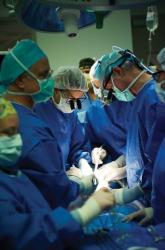Certain pregnant women who are carrying a fetus with severe spina bifida should be counseled about the potential benefits and risks of maternal-fetal surgery, according to the American College of Obstetricians and Gynecologists.
The ACOG Committee on Obstetric Practice recently recommended counseling about maternal-fetal surgery for myelomeningocele, the most severe form of spina bifida, following promising results from the procedure in an 8-year randomized controlled trial (Obstet. Gynecol. 2013;121:218-9).
In the Management of Myelomeningocele Study (MOMS), prenatal repair before 26 weeks of gestation reduced the need for a shunt at 12 months and also decreased the rate of hindbrain herniation by one-third at 12 months of age. The procedure also doubled the rate of independent walking and produced higher levels of functioning than were expected based on anatomic levels (N. Engl. J. Med. 2011;364:993-1004).
But the study, which was sponsored by the National Institutes of Health, also found significant maternal and fetal risks. For example, the surgery was associated with high rates of preterm birth, fetal bradycardia, oligohydramnios, placental abruption, pulmonary edema, maternal transfusion at delivery, and an increased incidence of uterine thinning.
ACOG cautions that the MOMS trial used stringent inclusion criteria and rigorous requirements for the experience of the surgeons involved. As a result, outcomes from the trial should be considered a "best-case scenario," the committee members wrote. They urged physicians to use the same inclusion criteria as the researchers when considering which women to counsel about the maternal-fetal surgery. The criteria were a singleton pregnancy, myelomeningocele with the upper boundary between T-1 and S-1, evidence of hindbrain herniation, gestational age between 19.0 and 25.9 weeks, and a normal karyotype. The major exclusion criteria included a fetal anomaly unrelated to the myelomeningocele; severe kyphosis; risk of preterm birth; a maternal body mass index of 35 kg/m2 or more; and contraindications to surgery, including previous hysterotomy in the active uterine segment.
Women should also be counseled about the implications of the surgery for future pregnancies, the ACOG committee recommended.
"It is a highly technical procedure with potential for significant morbidity and possibly mortality, even in the best and most experienced hands," they wrote. "Maternal-fetal surgery for myelomeningocele should only be offered at facilities with the expertise, multidisciplinary teams, services, and facilities to provide the intensive care required for these patients."
The study authors declared that they received funding from the National Institutes of Health. One of the authors reported receiving funding from Vanderbilt University in Nashville, Tenn.
m.schneider@elsevier.com
